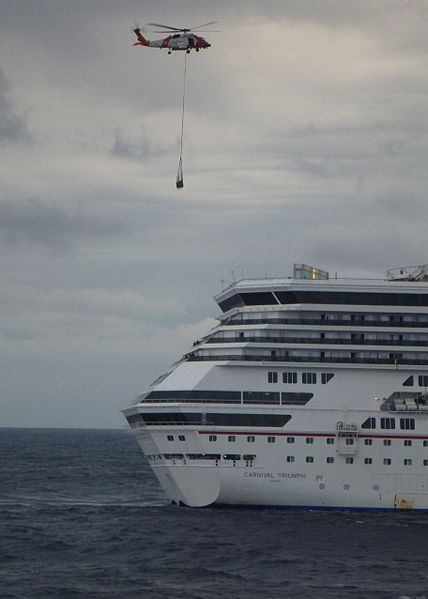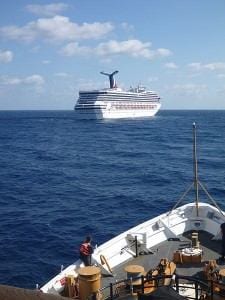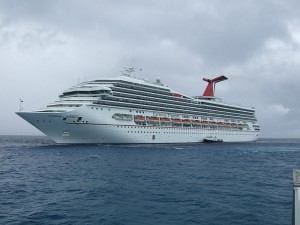 It took less than 24 hours for a Carnival Triumph passenger to file a lawsuit against Carnival Corp.
It took less than 24 hours for a Carnival Triumph passenger to file a lawsuit against Carnival Corp.
Cassie Terry of Brazoria County, Texas, was the first person to file a suit after the boat docked, claiming that Carnival could have brought the crippled ship to a closer port instead of spending four days being towed to Mobile, Alabama.
The lawsuit, filed by Texas-based maritime lawyer Marcus Spagnoletti, alleges, “Instead, Defendant Carnival Corporation chose to put the Plaintiff and other passengers on the ‘voyage of the damned’ for days without proper food or sanitation, all for the sake not of human life and well being, but corporate profit.”
The lawsuit also contends that Ms. Terry was in constant fear of contracting an illness while being forced to remain in a “floating toilet, a floating Petri dish, a floating hell.”
Another passenger, Kathy Marie Armstrong, of Plano, Texas, was the first to file suit against Carnival in Galveston, from where the ship departed, instead of Miami where the company is based.
However, history—and the law—say that it’s difficult to win these cases unless one can prove physical or illness due to the cruise operator’s negligence.
In November 2010, the Carnival Splendor had a fire that knocked out power by melting insulation around electrical cables. The fire was caused by a “catastrophic failure” in one of the ship’s diesel generators. The 3,006-passenger ship was towed from Mexico to San Diego by tugboats. Passengers endured three days without air conditioning, hot food, or cabin lighting.
Back then, Miami-based maritime lawyer Jim Walker explained that suing Carnival for this situation wouldn’t be prudent:
“In order to have a legitimate case for compensation, a cruise passenger has to suffer a personal injury. … taking cold showers, smelling toilets that can’t be flushed, eating Spam sandwiches in the dark or other similar “cruise from hell” stories are not compensable,” he wrote in a blog post.
Walker notes the only major difference between the 2010 situation and the current one was the presence of sewage on the Triumph. “You hear people saying they’re coming down with some types of ailments but I’m a little skeptical. These people went to lawyers before they went to doctors.”
So far, no one has reported illness from the cruise. Vance Gulliksen, spokesman for Carnival Cruise Lines, states, “During the course of the voyage, including when the Carnival Triumph lost power, there were no unusual occurrences of illness reported on board. The ship has now been extensively examined and will undergo a full repair process, including comprehensive cleaning of all affected areas.”
On his blog, Walker also pointed out after the Splendor situation, Carnival refunded passengers’ fares and travel expenses and offered a voucher for a free cruise in the future. “So if you are foolish enough to file suit (in Miami), you simply will not do any better than what is already being offered now,” wrote Walker. “Plus you will incur legal expenses and travel expenses pursuing a case in Miami which you are certain to lose.”
In the most recent situation, passengers were offered full refunds and travel expenses home, plus a free future cruise and $500 in cash.
Meanwhile, Matt and Melissa Crusan of Oklahoma filed a class-action lawsuit against Carnival. The suit was filed with Miami maritime law firm Lipcon, Margulies, Alsina & Winkleman, alleging that Carnival should have known that the ship was likely to have problems because of prior propulsion issues, and that Carnival towed the ship to Mobile instead of Mexico to save on costs.
“Carnival recklessly and intentionally put more than 3,000 passengers through a five-day living nightmare so it could protect its bottom line,” the suit says. It also notes that “human waste sloshed around the vessel as the vessel listed while drifting and/or while under tow.”
One issue: Carnival’s Contract of Carriage has a clause that specifically covers class-action suits:
“This contract provides for the exclusive resolution of disputes through individual legal action on guest’s own behalf instead of through any class action. Even if the applicable law provides otherwise, guest agrees that any arbitration or lawsuit against carrier whatsoever shall be litigated by guest individually and not as a member of any class or as part of a class action, and guest expressly agrees to waive any law entitling guest to participate in a class action.”
The legal team behind the class-action lawsuit argues that the class-action clause should be voided by Carnival’s negligence in using a vessel that was not seaworthy and not towing the ship to the nearest port.
However, Walker comments that class-action suits are generally reserved for victims of common damage–i.e. undisclosed credit-card fees–rather than consolidating those who suffer a wide variety of injuries.
 Situations like the Carnival Triumph, the Splendor, and the tragedy of the Costa Concordia, has put a spotlight on cruise safety issues. There is no one entity that oversees cruise ship standards, and most major cruise lines—though often based in port cities like Miami—fly under foreign flags. The foreign flag means the cruise lines can avoid U.S. laws and regulations, and it’s why cruise ships that start and end in a U.S. port don’t touch land anywhere else in the U.S. The Carnival Triumph was incorporated in Panama and its ships fly under the Bahamian flag.
Situations like the Carnival Triumph, the Splendor, and the tragedy of the Costa Concordia, has put a spotlight on cruise safety issues. There is no one entity that oversees cruise ship standards, and most major cruise lines—though often based in port cities like Miami—fly under foreign flags. The foreign flag means the cruise lines can avoid U.S. laws and regulations, and it’s why cruise ships that start and end in a U.S. port don’t touch land anywhere else in the U.S. The Carnival Triumph was incorporated in Panama and its ships fly under the Bahamian flag.
The International Maritime Organization (IMO) has a set of standards to improve maritime safety, but not laws.
According to IMO “passenger ships must be able to withstand and still safely return to port under their own power. If this casualty threshold is exceeded (i.e., the damage is such that return to port under power is not possible), then the ship is to remain viable for a minimum of 3 hours to allow for safe and orderly abandonment.” The ship must also maintain basic service including sanitation, food, water and lights.
However, this rule only applies to ships built after July 1, 2010 and the Triumph was built in 1999.
According to the most recent reports, investigators have learned where the fire began in the engine room of the Triumph, but it could be a year before they learn the cause.
For additional reports on the Carnival Triumph, check out
- Carnival Triumph: Passenger Rights and Cruise Industry Changes
- Post Carnival Triumph: How Safe is Your Cruise?
- Is the Carnival Triumph a Floating Biohazard?
- Peter’s Travel Tip: On-Going Cruise Safety Issues
By Sarika Chawla for PeterGreenberg.com













